Genre: Platformer Developer: Ma-Ba/Bandai Publisher: Ma-Ba Players: 1 Released: 1994
Completely altered in its eventual move stateside, Crayon Shin Chan is about a boy named Shinosuke who embodies all of the worst qualities of childhood; he’s rude and without tact, obnoxious, and seemingly exists to make everyone’s life miserable. A long-running manga and anime series, Crayon Shin Chan has been around for over two decades and is one of the more amusing series to ever come out of Japan. But how do you make a video game based on a series of self-contained sitcom shorts? Like most games based on licensed properties, Crayon Shin Chan takes many liberties in its attempt to offer up enjoyable game play. though it admittedly falls short in that arena, it is a definite success when it comes to recreating the look, feel, and sound of the television show.
I first discovered Crayon Shin Chan years ago when I was tinkering with emulation, and although the game didn’t blow me away, there was a certain aesthetic charm that kept me playing through to the end. There is a definite language barrier here, but even with a limited understanding of Japanese, the game is self-explanatory enough that you should be able to play it through without too many issues. Crayon Shin Chan is split into themed stages, with mini-games dispersed every couple of levels. The first set of levels has you moving around Shin-Chan’s neighbourhood and kindergarten, the next set puts you in a haunted forest, and so on. There are only four sets, culminating back at home in a winter setting, but there are enough individual levels in each theme to keep things at a half decent length. Crayon Shin Chan is short, but this works to its benefit; you will have had your fill by the time it is done with, and while the mini-games and visual appeal will keep things moving, the gameplay itself quickly becomes a tired, boring affair. Unlike the broad-appeal of the series, which has fans old and young alike, Crayon Shin Chan is clearly marketed towards a younger audience here.
Since the game has never been translated (much like its television counterpart that received a complete reinvention when it was brought over by Funimation, who scrapped the scripts and aimed it toward a more adult audience) it’s a bit hard to tell what is going on at times, but the objectives are fairly obvious. As Shin-Chan you walk around levels, talking to people to trigger simple mission objectives while avoiding enemies. Shin-Chan has a versatile set of moves and can run, jump, and crawl through tight places with ease. The controls are stiff in general and are a definite weak point here, but once you get used to the way things work they are not much of a hurdle to work around. In addition to the basic move set, you will also find blue cards scattered throughout the game which allow Shin-Chan to activate several different power-ups. These will allow Shin-Chan to heal himself, to summon his dog to attack enemies for him, and even to perform his infamous “elephant dance” where Shin-Chan draws an elephant around his crotch and pretends his genitals are the trunk, stunning nearby enemies (presumably out of disgust and disbelief) for a short period of time.
The objective of the game is to have Shin-Chan speak to various townsfolk who will activate objectives for the player which usually involve defeating an enemy to reveal a yellow object card which, after collected, will end the stage and send Shin-Chan on to the next level. It’s a platformer in the simplest sense, though it does not require any real finesse or skill on the part of the user to finish the flat, mostly lifeless stages throughout the game, barring a few minor exceptions. Crayon Shin Chan is more or less an exaggerated scavenger hunt, and this unfortunate lack of depth makes its target demographic of children more apparent. If you were a young child in Japan at the time of this games release, it might have been a fun play through, much like Ecco Jr., but most will quickly become bored at the stale, monotonous gameplay, and the tedium of backtracking that this game often requires.
Some of the mini-games are half decent, and interestingly enough they can all be accessed from the main menu to play at leisure, without having to trudge through the main game to play them. They are quite varied, though some of them will require you to be able to understand basic Japanese in order to play them. My two personal favorites were a piñata game where Shin-Chan is blindfolded, and you have to direct him to the watermelon, resulting in a pretty amusing animation of him falling over if you don’t, as well as a two-legged race with Shin-Chan’s mother where you need to alternate between the buttons and the D-pad as she counts for you. They are minor diversions, and the only reward you gain from beating them in the main game is an extra life, which is fairly useless since the game offers unlimited continues and liberal health restoring items throughout. But they are definitely a nice perk, and it is a bonus that you are not required to trudge through the main game in order to check them out.
Presentation is where the game truly shines, and I was amazed at just how wonderfully it captures the spirit of the show. The graphics are bright and colorful and offer accurate representations of the shows large cast of characters. You will see most everyone here, including Shin-Chan’s school friends, his mother and father, his teacher and his dog, and this attention to detail will surely please the fans out there, who are the only people imaginable who will want to take a look at this game. The animations of the characters and especially of Shin-Chan himself are varied and wonderful, and there are a surprising amount of them to be found throughout the game. There are sound bites and music ripped directly from the show, namely Shin-Chan’s mother calling him an idiot. Between stages there is a very familiar title card screen which is a great homage to the show as well, and will instantly be familiar to anyone who has watched an episode of Shin Chan. The music admittedly gets repetitive quickly, but it is well composed enough and easy on the ears. Shin-Chan is fairly dialogue heavy, but a lot of this seems to be flavor text, and by simply speaking to everyone it will be fairly easy to complete your objectives and move on. It is import friendly to a degree, but the question that needs to be asked is this: is it worth your time and money to order Crayon Shin Chan?
Although it is a fantastic homage to the source material it is based on in terms of presentation, its limited appeal and younger demographic will not make it worth a purchase for most. Dull, repetitive, simple game play does nothing to help here, and the end result is a product which can really only be enjoyed by die hard Shin Chan fans; most of whom happen to be Japanese school children between the ages of four and ten. Avoid unless you are really striving to complete your Mega Drive collection.
SCORE: 3 out of 10

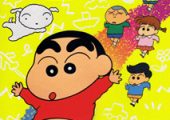
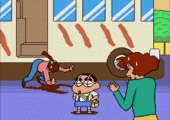
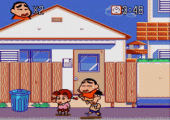
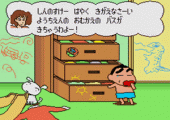
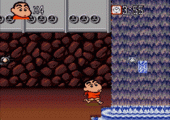
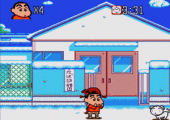
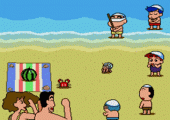
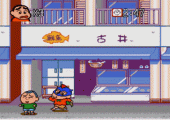
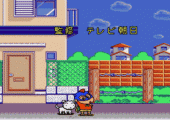
Recent Comments